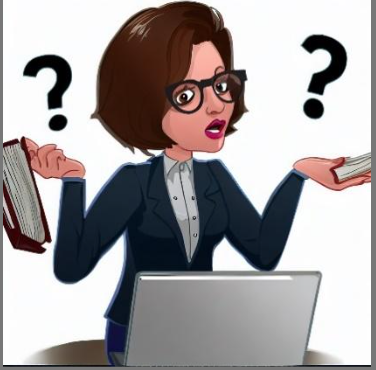By Aamir Abdullah (Follow us on LinkedIn)
As one will notice by observing my contributor’s page, I am immensely interested in the intersection of law and technology. There are many reasons I am so interested in this intersection. Two of those reasons deal with accessibility and ease of access1.

Obviously, the internet has revolutionized both. Most people in the United States have access to the internet. Online tools like screen readers and dictation broaden access by making accommodations easy to attain. Widely accepted web accessibility standards have made it so that much of the information online is available to a vast majority of people in the US. The internet also allows people to easily look up information at any time, any day, and anywhere. And, most libraries allow access to their materials via the internet2. This, in a lot of ways, helps with accessing information that may otherwise be difficult to attain.
The notion of accessibility and ease of access falls apart when there is an impediment to such access. E.g. when material being researched is not available online. This kind of impediment is sometimes mind-boggling given the era we currently live in.
As a law librarian who believes in Access to Justice and access to information, I get frustrated by such obstacles. Afterall, people constantly champion that technology will democratize the law. But, really, how can that be if even 1 person does not have access or cannot access legal information?
Recently, I ran into such an impediment, and I decided to ask for help.
Access to the Historical Colorado Revised Statutes

I’ve met many visitors at Colorado Law’s3 William A. Wise Law Library who want to see old versions of the Colorado Revised Statutes (“CRS”)4 The CRS is the current rendition of the Colorado Statutes. Some of the older editions of the statutes go by different titles5.
Thanks to the Colorado General Assembly and LexisNexis, you can find Colorado’s current statutes online6. The current version of the CRS is also available in print, at law libraries throughout the state7, and on the various legal research search engines.
However, things are harder when it comes to locating older statutes. Some institutions might have the complete catalog of the older statutes in print8. Some of the legal research search engines might have selected years of the statutes9. And, if an institution provides access to HeinOnline, then many of the historical statutes are available10.
Post pandemic, it has been easier to tell patrons to come into the law library. Although not necessarily the easiest way to access the older statutes, the law library provides access to the entire historical statutes in print. The law library also provides institutional access to legal research websites with most of the older statutes in digital form.
Not being able to access all the historical statutes never really bothered me. That was until the Fall 2022 semester.
Hi [insert name], my name is Aamir Abdullah
In the 2022 fall semester, I, along with two colleagues, began thinking about presenting at the Kramer Copyright Conference. We discussed presentation ideas, picked a format, and made a plan for an exceptional application during the meeting. After submitting the application, we just kind of hung out – planning out and thinking more critically on the next steps.
Out of the extensive conversation, stemming from the initial meeting, there was one question we could not wrap our heads around. Why hadn’t HeinOnline, or another large publisher, provided digital copies of the Colorado Revised Statutes between the years of 1960 and 1980? It seemed pretty straightforward—Someone owned the copyright, so why didn’t a large publisher just buy the right to provide access?
Because HeinOnline already provided access to the statutes from inception to 1960, I decided to ask someone in the organization the question. I found the name of a person on HeinOnline’s Company Directory, who I thought could give me the information I needed11. While my two colleagues were talking, I simply sent a cold-call email to someone on the HeinOnline team asking:
Hi [Name Redacted],
My name is Aamir Abdullah. I’m a law librarian at the William A. Wise Law Library. I’m working on a project on digitizing the historical Colorado statutes from 1960 to the 1980s. As a preliminary step, I’ve been researching what’s out there, and to determine why there hasn’t been any digitization of the historical statutes between 1960 and the 1980s.
Do you happen to know why HeinOnline doesn’t digitize or offer a digitized version of the Colorado historical statutes after 1960? There appears to be a digital gap between the 1960s and the 1980s.
Any direction, help, or guidance will be greatly appreciated.
Best wishes,
Aamir Abdullah
The Waiting Game
After emailing the random employee, I wasn’t sure what to expect. Having been in sales for some time, I figured the recipient would either not reply or reply when they were ready. Either way, I rejoined the conversation with my group, and we inevitably dispersed.
Surprisingly, I heard from someone else at HeinOnline just 2 days later. We then corresponded, lightly, over a week. At the end of our correspondences, the HeinOnline employee informed me he would look into adding the 1963 and 1973 versions of the CRS.
Then, I suppose, we both forgot about the issue. That was until March. To my astonishment, the same HeinOnline employee sent me an email claiming that HeinOnline would add the 1963 and 1973 versions of the CRS in June! And, on July 3rd, 2023, I am very proud to say—HeinOnline added access to the 1963 and 1973 versions of the CRS for all to enjoy.
The Question

I think, a lot of times, it scares people to ask questions. (Particularly in this field—where we are deemed “knowledge experts.”) And, I think people, in general, are averse to reaching out to someone they don’t know.
(Sometimes people are even nervous to reach out to people they do know.) Interestingly, I find, within my circle, that this fear is based on not knowing how the other person will react
When things go well, my friends and family are usually ecstatic. When things go “as expected” they are in no worse position than prior to making the ask. Therefore, I encourage any reader to go out and ask questions.
Ask questions of people you know.
Ask questions of people you don’t know.
Ask questions to yourself.
After all, the outcome might surprise you.
Notes:
1. Accessibility dealing with how material is actually accessed. And, ease of access dealing with how easy it is to access the material.
2. Although, material may only be accessible while physically at the library.
3. Colorado Law is the shorthand used for The University of Colorado Law School.
4. Note, Colorado’s statutes were not always called the “Revised Colorado Statutes,” for more information concerning the history of Colorado’s statutes please reference Robert Linz’s “Colorado Legal Research.”
5. See Colorado Law and Legal Research LibGuide from William A. Wise Law Library.
6. To review the 2023 CRS, please see The Colorado General Assembly website.
7. All 4 of them… The state Supreme Court Law Library, the federal Court of Appeals Law Library, Denver University’s Law Library, and the William A. Wise Law Library.
8. Mine does.
9. Westlaw offers Colorado statutes from 1989 to today, while Lexis offers Colorado statutes from 1992 to present.
10. More on this below.
11. I made this determination based on the title of the individual.
12. The initial inquiring email to HeinOnline went out on September 28th, 2022. HeinOnline emailed me that the 1963 and 1973 versions of the CRS would be added on March 13th, 2023.
—————————————————————————————————–
Notes Between Us (NBU) is a blog about conversations and topics of interest to the writers. The writers are expressing their personal opinions solely. The essays represent their personal beliefs and not those of their workplaces or any organization they are associated with.
